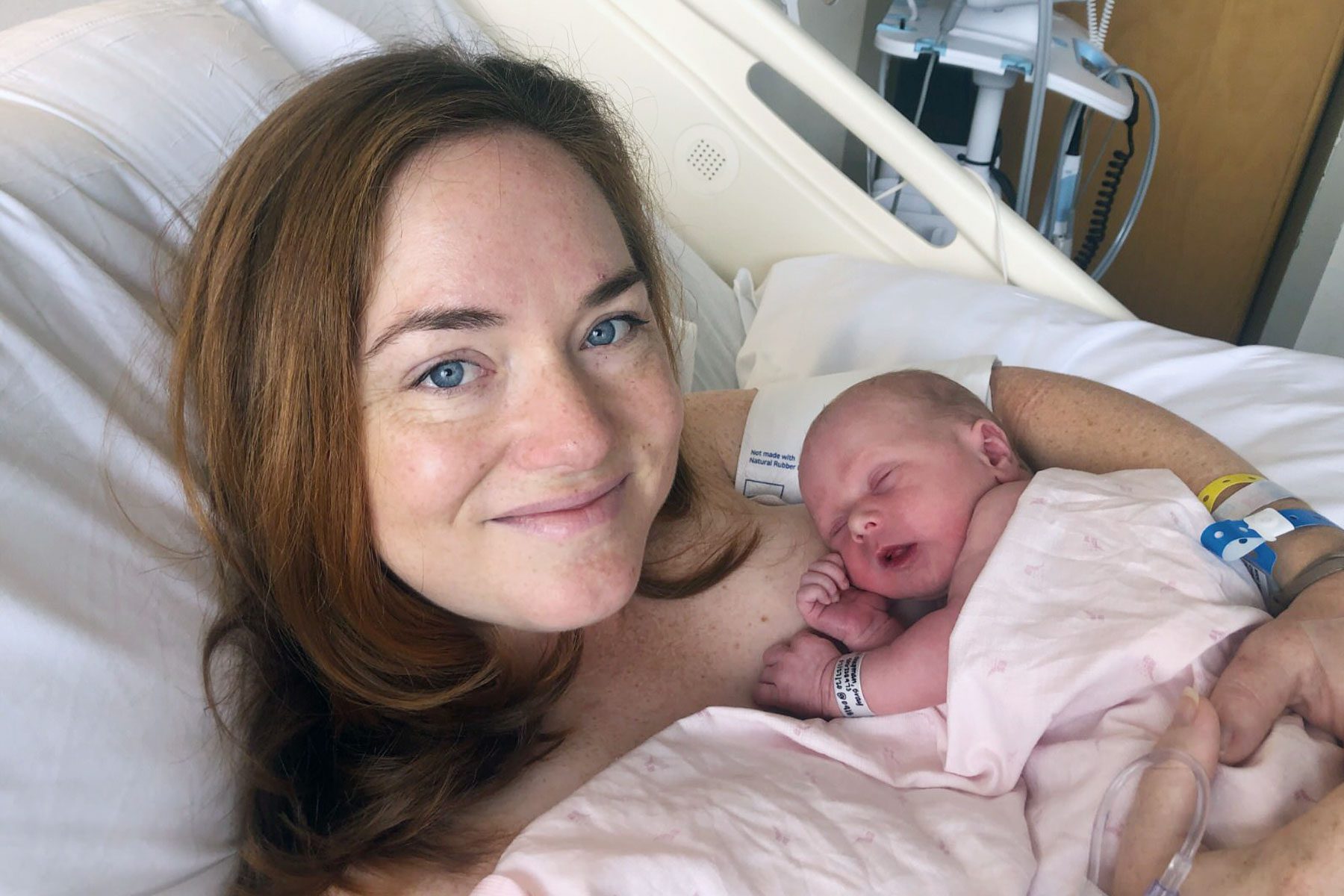Throughout Gray Chapman’s pregnancy, visits to her midwife’s office always meant being asked if she planned to breastfeed. The question didn’t faze Chapman, who told The 19th that she would answer by saying, “Yeah, if it works great, but if not, there’s always formula!” At the time, she meant it, too.
But a difficult birth led to a five-day hospital stay, and Chapman — an Atlanta-based journalist — found her time in the hospital marked largely by a lactation consultant who just wouldn’t leave. Every day for four to five hours a day, the lactation consultant was in her hospital room, trying to help her understand why her newborn wouldn’t latch. With her baby rapidly losing weight and at one point going 26 hours without a wet diaper, at no point did anyone in the hospital so much as mention the word “formula” to Chapman.
Toward the end of Chapman’s post-birth hospital stay, with a baby still struggling to feed, the lactation consultant finally offered up a suggestion for an alternate plan: She told Chapman that in lieu of trying to breastfeed, she should try pumping and bottle feeding.
“The troubling part,” Chapman said, “was that there were no professionals around me who were willing to step in and say, ‘This woman is recovering from a C-section and is unable to feed her hungry, six-pound baby — maybe we should bring in the Similac.’”
Though Chapman said that she doesn’t believe anyone ever directly spoke the words “breast is best” directly to her, she nevertheless felt overt pressure to breastfeed her child at all costs. After all, she said, why else would the lactation consultant be spending so much time with her if this wasn’t “something I had to make work”?
About a week later, National Breastfeeding Awareness Week began, and Chapman’s Instagram feed was suddenly flooded with “beautiful black-and-white shots of women breastfeeding their babies.” Looking over at her husband, then finally feeding their newborn son with a bottle and formula through a second lactation consultant’s advice, she broke down. “I just sobbed,” she said. “My husband has never seen me cry like that and we have been together a really long time. World Breastfeeding Week made me cry.”
“I knew intellectually that breastfeeding just wasn’t worth it, that all things equal there wasn’t a huge difference nutritionally between breast milk and formula. But when [my son] came out, I lost all sense of perspective and felt that I had to make this work,” Chapman said.
She’s not the only one who has felt this way. While the American Academy of Pediatrics recommends breastfeeding exclusively for the first six months of a child’s life — then followed by a combination of breastfeeding alongside the introduction of solid foods for another year — the reality remains that for many parents, breastfeeding is simply not feasible, either because a parent parent struggles to do so either as a result of mechanics or mental health challenges, or because breastfeeding simply isn’t an option based on their own medical history or family- building mechanisms.
For these parents, being told “breast is best” implies that straight out of the gate, they have already failed their children by offering them something inherently not the best, says Laura Modi, the co-founder and CEO of Bobbie, an organic formula company. It’s also why Modi’s company is asking people to ask “How is feeding going?” instead of “How is breastfeeding going?” when talking to new parents, especially during National Breastfeeding Awareness Month in August — and beyond.
The issue is also personal for Modi, who herself always assumed she would breastfeed and says she went into her pregnancy “completely ill-prepared for what would happen if breastfeeding doesn’t work out.” What happened for her, she told The 19th, was being “hit with guilt, embarrassment, and shame when I realized I was unable to exclusively breastfeed my child.” But she also said that it taught her that she’s also part of a wider community of parents who for any reason are unable to breastfeed, be it those who have had double mastectomies, used gestational carriers, or grown their family through adoption. (Not to mention those, like Chapman, who simply struggled with the work of breastfeeding through no fault of their own.)
She pointed out that more babies are being born via surrogacy today than ever before and close to 200,000 American children are being raised by same-sex parents. “Those folks need an alternative, but the message hasn’t caught up.”
“I always remind patients that just like there are many definitions of the titles ‘mom’ and ‘dad’ — and many descriptions of a childbirth — there are also many definitions on how to nurture a newborn; breastfeeding is just one of those terms,” Dr. Brian Levine, the founding partner and practice director of CCRM New York, a infertility and reproductive endocrinology practice, told The 19th. Levine sees many patients at his practice that are LGBTQ+, utilizing gestational carriers, and for any number of medical reasons may be unable to breastfeed.
Dr. Christie del Castillo-Hegyi is a board certified emergency physician and investigator of, newborn brain injuries and breastfeeding complications, and is also the co-founder of the Fed is Best Foundation, which seeks to provide safe infant-feeding information to parents and healthcare providers, be it by breastfeeding, formula supplementation or otherwise. Del Castillo-Hegyi pointed out some widely acknowledged benefits of breastfeeding, such as its accessibility and the sharing of antibodies, but also said that parents who struggled with it should understand that “fed is best, no matter what. Any child who receives the full nutritional requirements without starvation or dehydration has the best outcomes.”
But experts from the American Academy of Pediatrics caution to not discount the importance of breastfeeding and the immunological merits of breast milk too much. Dr. Lori Feldman-Winter, a professor of pediatrics at Cooper Medical School of Rowan University and the chair of the American Academy of Pediatrics Section on Breastfeeding, told The 19th that while “breast is best” might be an overly simplistic slogan, “it is important to be aware of the science and the overwhelming evidence showing improved health outcomes related to breastfeeding, for mother, for baby, and for society” — but that it’s just as important “to understand why and how the decisions to breastfeed, or not, are made.”
Feldman-Winter says that there are documented benefits of even short-term breastfeeding, such as a recent study which indicated that breastfeeding decreased the chances of high blood pressure in children, providers should use the prenatal period to to have “open, honest and nonjudgmental” conversations with parents about infant feeding “and explaining what we know about the benefits of breastfeeding, as well as the risks of supplementing with infant formula.”
That said, Feldman-Winter also added that “for those unable to breastfeed at all, we must reassure families that we have a suitable alternative in safely prepared commercial infant formula. We should applaud even the tiniest amount of mother’s milk that the baby was able to receive and her effort in trying.”
Del Castillo-Hegyi said that while data indicates that breast milk is an excellent source of nutrition, has antibodies present in it that may provide extra immunity, and is generally sterile, it’s still not a perfect nutritional product because of its inherent vitamin deficiencies. Without nutritional supplementation or monitoring, exclusively breastfed infants can present with anemia as a result of iron deficiency around four months of age. Formula doesn’t have antibodies or any of the potential immunity-boosting factors of breast milk, but parents who cannot breastfeed have “a nutritionally complete form of milk and no baby will ever go hungry from eating it,” she said. “If it is offered to a baby from the moment they are born to whenever they stop feeding in this way, there is zero risk of them developing malnutrition, hypoglycemia, or jaundice.”
Some of those problems can be addressed at a hospital, often so quickly that they’re not part of the broader conversation. Other times, parents don’t know to look out for them, and the consequences aren’t visible until later. For instance, research has suggested that when a mother does not produce enough milk, a newborn who is exclusively breastfed is at increased risk for hypoglycemia. Some hypoglycemic babies develop levels severe enough to increase their risk for developmental delays and lowered academic performance. Researchers in Arkansas found that newborns who had moderate hypoglycemia early on often struggled years later with reading comprehension and literacy skills.
Levine said that the “number one shared emotion” he hears from his patients who for any number of reasons are unable to breastfeed is “frustration since so much of our language [around feeding] implies that breast is best. In reality, breast is available for many and used by some, but love and nurture are much more important than the mode of feeding.” He stressed that while breastfeeding is a “natural way to help support a newborn, it is not the only way.”
Del Castillo-Hegyi told The 19th that the current stigma surrounding those who do not, and cannot, breastfeed comes from developments in recent history. Breastfeeding has always been the primary source of infant feeding — even though from as early as the Iron Age, there is evidence of parents finding ways to provide supplemental nutrition because breast milk often does not meet all of an infant’s nutritional needs. The farming revolution made animal milk widely available, and researchers eventually found that adding several micronutrients to animal milk led to a form of nutrition that was readily available at any time — and that’s how formula was born.
Giving in to a kid who is hungry is the best thing you can do as a parent.
Dr. Christie del Castillo-Hegyi, a co-founder of the Fed is Best Foundation
Baby formula soon became a popular product, one that was marketable — perhaps too much so. Commercialized campaigns to bring it to more and more markets led to it being pushed on parents in developing countries who often could not afford it or did not have reliable access to clean drinking water. This ultimately led to many infants dying from starvation or malnutrition. In response to this tragedy in the 1990s, the World Health Organization launched its “Breast is Best” campaign, and soon after came the guidelines from various organizations recommending exclusive breastfeeding for the first six months. It also led to a vilification of infant formula, and a not-so-subtle message that parents who formula feed “just don’t care enough about their infants and didn’t try enough or are not educated enough,” says del Castillo-Hegyi, even though a lack of robust data meant that it was never clear if a majority of parents could carry out the recommended breastfeeding guidelines.
Feldman-Winter still pointed out that there are some adoptive mothers who can lactate, and that chest feeding may also be possible in the trans population. “We need to be open to the options, explain the advantages of human milk over the unknowns of exposure to hormones in the case of gender-affirming hormones, and the desires of the partners/parents involved,” she said. “If breastfeeding-chestfeeding-human milk feeding are not options then we recommend commercially prepared infant formula, holding during feeding and responsive feeding to prevent overfeeding …. As pediatricians we need to be steadfast in our support of breastfeeding, but at the same time recognize that there are many factors involved in good parenting.”
Lesley Anne Murphy, an Instagram influencer and former contestant on The Bachelor, had a preventive double mastectomy in 2017 after her mom had been diagnosed with breast cancer and Murphy herself had tested positive for having the BRCA gene. She knew that having her breasts removed would mean she wouldn’t ever be able to breastfeed, but told The 19th “in my eyes, it was more important to take care of my own health than to have the option of breastfeeding one day.” But after giving birth to her daughter last year and posting about formula feeding on Instagram, she was shocked by the kinds of comments popping up in her feed, with people attacking her choice to have had a double mastectomy without having had cancer. “You don’t forget those comments,” Murphy, a spokesperson for Bobbie’s “How is Feeding Going” campaign, said. (Bobbie has since started donating a can of formula to parents in need for each new trolling remark on Murphy’s social channels.)
If breastfeeding isn’t working, or if it isn’t an option, del Castillo-Hegyi said, then “giving in to a kid who is hungry is the best thing you can do as a parent. To be shamed by society because you gave your baby formula is severely harmful.”
After five months of attempting to first breastfeed and then pump and supplement, Chapman realized that breastfeeding was something she was pursuing because it had become “a sunk cost thing. I felt like I had been miserable doing this for months already and I couldn’t give up now.” Finally after pumping a particularly bloody bottle of milk one day, Chapman decided it was time to call it quits. “And that was it. And it was fine. I didn’t have any emotional fall-out from switching exclusively to formula. It was a mental health game-changer for me. I am honestly just mad it didn’t happen sooner.”
Editor’s note: This story has been updated throughout.







